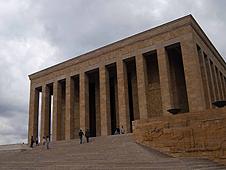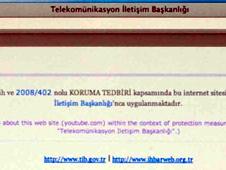Turkey goes into battle with Google
- Published
Last month Turks found they could not access many Google services. YouTube is already banned. The BBC's Jonathan Head looks at this brewing battle between Turkey and one of the giants of the internet.

Ataturk Mausoleum: Turkey bans abuse against its founding father
Sitting in an Istanbul cafe Ozan Tuzun taps away furiously on the keyboard of his laptop, trying to break the invisible walls that surround him.
"I'm going to DNS.com now to take one of their numbers… I enter it… no that didn't work. Right let's try to get a DNS from Google… no… ok we'll try Ktunnel…"
What Ozan is doing - and it takes him about 10 minutes - is something most of us can do in just seconds.
He wants to watch YouTube. And he is an expert, a technology buff; most people trying the same thing from Turkey would give up.
"It's very frustrating, it makes me feel like I'm living in a third world country," he says.
The ban on YouTube was imposed by a court in Ankara on 5 May 2008, after a series of 17 temporary bans the preceding year.
The grounds by the courts given each time varied, but they followed a number of complaints from Turkish citizens about videos on YouTube deemed insulting to Kemal Ataturk, the country's revered first president.
Crimes against Ataturk
In 2007 the government passed a sweeping law regulating the internet, known as Law No 5651.
It allows a court to block any website where there is "sufficient suspicion" that a crime has occurred.
The eight crimes listed include child pornography, gambling, prostitution, and "crimes against Ataturk". Insulting or denigrating Ataturk was already a crime.
The Turkish government refuses to publish statistics, but campaigners for internet freedom estimate that more than 4,000 websites are currently blocked, making internet censorship in Turkey amongst the heaviest in the world.
"For years I wrote about China and Middle Eastern countries that tried to censor the internet," says Serdar Kuzuloglu, the technology editor for Radikal newspaper, "but I could never imagine that one day I would be writing the same things about my own country."
"The blocking process is very unclear. There are eight categories of crimes which allow the courts to block a site, but it can also come from an individual complaint.
"It's very difficult to find the responsible person."
No warning
So when, in addition to YouTube, many of Google's other popular services became impossible to access recently, it was difficult to know who had ordered it.
A court? The Information Technologies Authority in Ankara, responsible for enforcing bans?
There was no warning. Everyday tools like Google Maps and Google Analytics relied on by thousands of small businesses were blocked.

This is all that people in Turkey see when they try to access YouTube
Companies like top graphic design house Bravoistanbul suddenly found they could not access their e-mails or their office server.
"You can't imagine that something like this could happen," says Ozlem Pekel, one of the company's founders.
"We paid for three years so we wouldn't have to worry about our server fees, and it turns out we paid for nothing - we paid for a blocked account.
"And it's Google! It just shows you how much respect the government has for us, the taxpayers."
It turns out that the Turkish authorities blocked a number of IP addresses they thought were being used to access YouTube, but which had been reconfigured by Google for other services as well.
But there is confusion because the government also accuses Google of not registering as a company in Turkey and paying local taxes.
Google runs its European operations, which include Turkey, out of Ireland, and pays most of its taxes there.
The fact that it does not pay tax in other countries is already a source of criticism, but Turkey is the first country to wield the stick of censorship over the issue.
Two different Turkeys
The government's position gets even more confusing when people recall that Prime Minister Recep Tayyip Erdogan confessed that he regularly found ways around the YouTube ban, and encouraged others to do the same.
President Abdullah Gul put a message on Twitter recently saying he was "definitely against" YouTube and Google services being blocked.
There are two different Turkeys talking here.
There is Istanbul, buzzing with entrepreneurial activity and cultural life, where people aspire to European levels of wealth and freedom.
And there is the capital Ankara, a city of bureaucrats, the centre of military and political power. Ankara is where nearly all the internet restrictions emanate.
The city is dominated by the austere, neo-classical mausoleum of the founding father Ataturk, where people line up every day to pay their respects to modern Turkey's founding father.
Not far from the mausoleum, in a nondescript residential building, is the office of the Ataturk Thought Association, an organisation dedicated to protecting the secular heritage of the first president.
They have been behind many of the complaints against Google, YouTube and other websites.
Tansel Colacan is the formidable chairwoman of the association, a retired senior judge. And she is unapologetic about the impact of her complaints.
"For us Ataturk is a symbol of democracy and women's emancipation," she says. "This is about respect for him. I am not bothered by the impact of the court decision."
At the offices of the Information Technologies Authority, when asked whether blocking sensitive material was more important than the well-being of thousands of small businesses, there was a more nuanced response.
"If you ask me as a personal question, my answer would be different," said Osman Nihat, head of the Internet Department.
"But as a government person I would say this is a court decision, and there is a law. I have to apply the court decision and the law. Those are insulting videos - they should see this and obey," he added.
Google has said in a statement that it pays all the taxes it is legally required to pay, and that the Turkish government is asking it to remove offensive material from all YouTube sites, and not just to restrict access to it from Turkey.
Its services have now been blocked or restricted for a month, with no solution in sight.